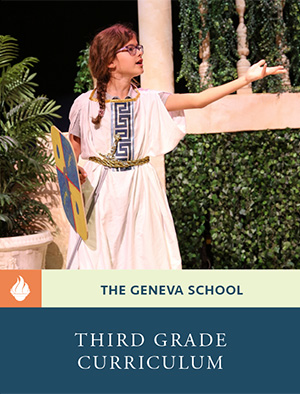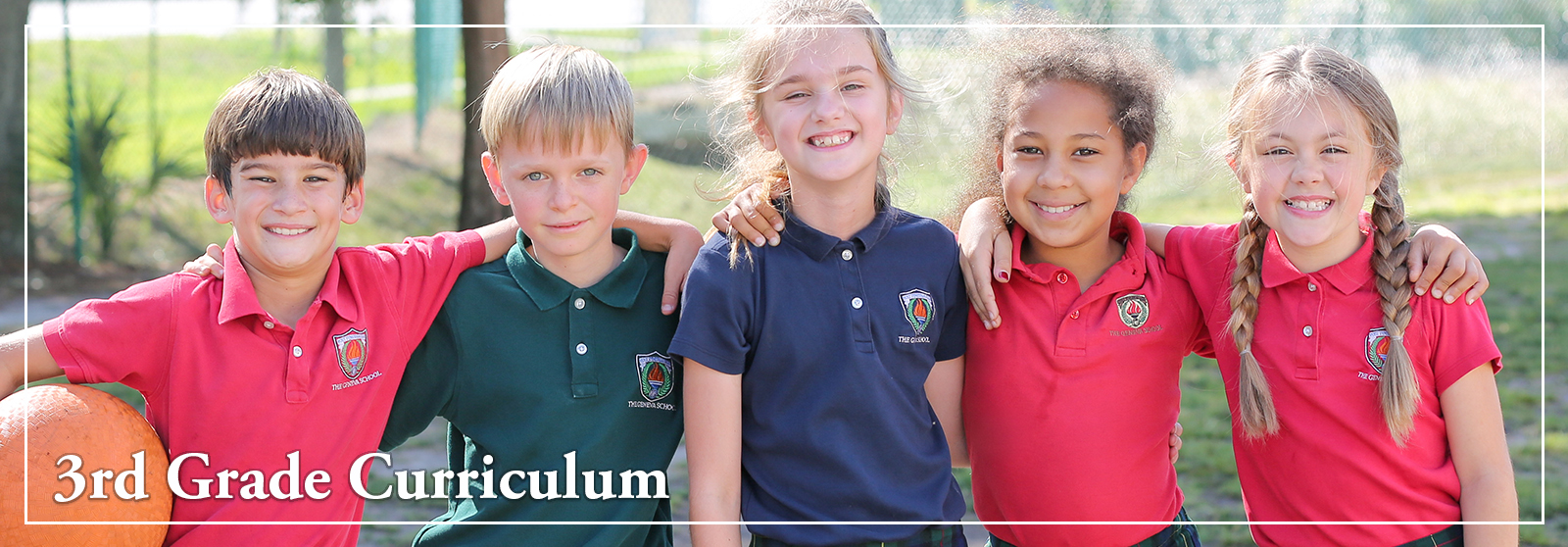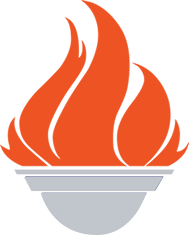3rd Grade Curriculum

“Why did you do all this for me?” Wilbur asked. “I don’t deserve it. I’ve never done anything for you.”
“You have been my friend,” replied Charlotte.
The third grade year at The Geneva School marks a grand year of growth and maturity. Students explore the theme of friendship, as experienced in the sweet relationship between Charlotte the spider and Wilbur the pig in Charlotte’s Web. Teachers seek to provide a purposeful and joyful learning environment where students add to a growing list of basic tools foundational to academic success. Teachers seek to enable students to embrace a deepening awareness of God’s love, help them grow in friendship with others, instill a desire for a lifelong passion for learning, and encourage developmental readiness in self-governance and responsibility.
History
(2000 BC–AD 476)
After exploring the foundation of history from creation through the ancient Egyptians in second grade, students move ahead on the historical timeline as they explore the stories of the Minoans, the Mycenaeans, the ancient Greeks, and the Romans. Reading exciting stories that stir their imaginations and leave them wide-eyed in amazement, the students become familiar with the history of these impressive peoples. Third graders imagine the fear and the bravery of Theseus weaving his way through the labyrinth to slay the Minotaur. They try to identify with the weariness of the soldiers fighting for ten long years, and they are able to experience what it felt like to climb inside the Trojan horse. The story of the Trojan War comes alive when students perform for parents, wearing the chitons and shields they have made themselves. To culminate their Greek studies, students enjoy a week of celebration during Greek Week. Designing and decorating their own pottery, eating an authentic Greek feast, making a Greek mask, and participating in authentic Greek Olympic games bring ancient Greece to life. Students then turn their attention to Rome and study Roman life, wars, and famous emperors. Fascinating stories of life during ancient Greek and Roman times—their gods and goddesses, passions, and contributions that affect our lives today—help students better understand their own history and the story of Western civilization.
Language Arts
Reading, Spelling, Grammar, Composition, and Handwriting
Third grade students continue to build on their knowledge of and skill in the basic tools of language. The goal is to equip students to read with fluency, comprehension, and joy and to write with clarity, purpose, and passion. Students learn through an integrated approach of reading, spelling, grammar, composition, and handwriting. The main method students use to assimilate the text that they read is the classical practice of oral narration. Once the students become fluent in oral narration, they transfer their oral narrations to written narrations. This practice is foundational in strengthening the students’ abilities in reading comprehension, writing, and rhetoric. Skills are repeatedly taught and practiced across the curricula. Third grade composition instruction is theme-based, following the structure set forth by the Institute for Excellence in Writing. Over the course of the year, students’ writing increases in complexity as they compose in a variety of formats on such topics as the Trojan horse, Alexander the Great, and Pompeii.
Spelling instruction is phonics based and follows the Orton-Gillingham approach. Phonemes and spelling rules are taught explicitly in a structured and sequential manner. Third graders progress through advanced spelling patterns and rules. Over the course of the year, they grow more adept working with vowel teams and using rules to add suffixes to their spelling words. The program is cumulative, helping students to strengthen previously learned skills as they learn to work with new letter combinations and rules. To address multiple learning modalities, teachers use a variety of methods for teaching language. Students chant, sing songs, dance, and move around the classroom. All of these methods engage the brain and are designed to build both fluency and comprehension so that the students’ love of learning lasts a lifetime.
Literature
“Oh, don’t stop now! Keep going!” is a familiar refrain teachers hear when reading quality literature. Books such as C. S. Lewis’s The Lion, the Witch and the Wardrobe, E. B. White’s Charlotte’s Web, and George Selden’s The Cricket in Times Square are intentionally incorporated into the third grade literature curriculum to foster a love of story.
Teachers use these well-told, compelling stories as springboards for other projects that broaden the study of literature. Students explore the themes of friendship and adventure as they read The Tale of Despereaux. During the study of Charlotte’s Web, students perform a play for parents and friends. The unit culminates with a county fair where students participate in old-fashioned games such as tug-of-war, three-legged races, apple bobbing, pie eating, and a pig-decorating contest. While reading The Cricket in Times Square, students celebrate by pretending to ride a “subway car” (our local SunRail) like Mario and Chester and decorating matchboxes for their “pet” crickets. Finally, students read The Lion, the Witch and the Wardrobe, imagining themselves in the mythical world of Narnia along with Peter, Susan, Edmund, and Lucy. They create a mythical mosaic creature from the land of Narnia, which draws upon the students’ imaginations while increasing their enjoyment and understanding of this classic story.
Library Science
Third grade students continue to develop library skills and learn to use the automated catalog. They learn about the different genres of literature, how to find them, and how to make good choices among them. They are introduced to the Dewey Decimal System and learn how to find titles in the nonfiction and fiction sections of the library. They also learn to identify and use the different parts of a book and how to use various reference materials.
Mathematics
God’s beauty and order are evident throughout his world, and students learn to appreciate them as they study the art of math. Singapore’s think!Mathematics curriculum helps students gain a depth of conceptual understanding, increase fluency, and build confidence in problem-solving. Concepts are first taught from the concrete using hands-on manipulatives and then further explored and understood by illustration using bar models. Having experienced math conceptually and illustrated concepts with bar models, students are then able to express mathematical concepts abstractly with number sentences. This process of working from concrete to pictorial to abstract allows students to grow in their understanding and in the ability to incorporate mathematical skills and ideas in real-world problems. With daily math-facts practice, the goal is for students to master all addition, subtraction, and multiplication facts over the course of the year.
Bible
The history of God’s people is a miraculous one, full of stories of God’s faithfulness. Third grade students study the historical and poetical books of the Old Testament.
The year begins with the story of the Israelites as they are poised to enter the Promised Land under the godly leadership of Joshua, and it finishes with the exciting narrative of Solomon. Students enter into the lives of real people living lives of faithful obedience and disastrous disobedience, all the while rejoicing in God’s continued faithfulness to them. Third grade explores what it means to love God and follow him as they study the lives of the judges, Ruth, Hannah, Samuel, Saul, David, and Solomon. Teachers intentionally connect these biblical characters to students’ present circumstances so they are able to learn more about the one sovereign, faithful God, the consequences of sin, and how to walk in love and obedience with him.
Science
Imagine your child walking into a dark classroom whose door has been transformed into a cave entrance. Hanging from the classroom ceiling are stalactites and bats of various kinds. The teacher is wearing a caving helmet and has a flashlight. Subsequently, students begin a story that follows two children as they get lost in a cave. Their friend Bat helps them through the cave. In this way, third grade students learn how caves are formed, the life cycles of animals in caves, and, most notably, the wondrous beauty found in the rock beneath their feet. In a similar manner, third grade science students at The Geneva School explore and discover any number of topics—the Everglades watershed, vertebrates, and the skeletal/muscular systems of the human body. Owl pellet and fish dissections are incorporated into the curriculum to complement the vertebrates and food chains unit. In the spring, the students visit the Marine Discovery Center in New Smyrna Beach to enlarge their science learning experience with an exploration of the Indian River Lagoon. All of creation, as it is uncovered by our studies, inspires admiration for our great God!
Foreign Language
The language arts are a centerpiece of classical education, and the study of foreign languages, ancient and modern, has always been part of the core classical curriculum.
Third grade students begin their study of Latin, which continues through grammar and dialectic school, with the option of further study in rhetoric school. By hearing and speaking the language, they become confident in pronouncing Latin and begin to gain a sense of its grammatical structure. Students acquire a sizable Latin vocabulary and are able both to translate from Latin and to compose simple sentences in Latin. They also memorize some key prayers of the ancient church, tying their appreciation of Latin to the story of the Christian faith.
Music
In every grade in The Geneva School lower school, music study and performance are vital to developing an aesthetically rich liberal arts education. Third grade students study the Pythagorean ideas, music, and instruments of ancient Greece and Rome. Students are immersed in the cultures of ancient Greece and Rome as they learn about the music created by the Greeks and Romans, which we still use today.
Ear training, singing, and the study of rhythm continue through the Kodaly method. Students sing hymns, folk songs, and spirituals and learn to hear, decode, notate, and improvise music with an ever-increased depth of understanding and difficulty. Third graders use their developing musicianship skills to notate melodic and rhythmic patterns. Students play Orff instrumentation to enhance their auditory skills and hand-eye coordination while playing and recognizing melodic and rhythmic patterns founded in ancient Greece by Pythagoras.
Classical symphonies are used as a means to explore elements of music, such as dynamics, melody, form, tempo, meter, and rhythm. Students explore these elements as they study the stories in the Old Testament and, in particular, the story of God’s chosen people, Israel; this study enhances and further deepens their appreciation for and understanding of biblical history.
Music performances include Lessons and Carols, the Charlotte’s Web performance, and the spring concert.
Art
In third grade, students are introduced to various approaches in representational drawing, which enhances their understanding of symmetry and proportion. Much of the art of the Greco-Roman world allows students to explore and imitate a variety of media and concepts while encouraging personal expression and interpretation.
Relating to their Greco-Roman studies, students learn about and create mosaics, pottery, architectural representations, collages, and plaster replicas. While third graders read The Chronicles of Narnia and Charlotte’s Web in literature, students create character studies using acrylics, oil pastels, and colored pencils as they practice blending, shading, and other artistic techniques. As students further their study of the elements of art and principles of design, they are encouraged to learn from one another as they explore their individual styles. Through each project, students learn a host of visual vocabulary to help them grow in art appreciation and are encouraged to engage in discussions of the visual aspects of this world.
Drama
The drama program not only seeks to enrich students’ learning through experiencing history and literature but also seeks to build character through the rehearsal and production process. Students take on responsibilities appropriate to their developmental level, and they problem-solve and work together as an ensemble, emulating the body of Christ, as they tell their story.
In third grade, the students perform The Trojan War play, a story from their history lessons with a playfully witty twist; they also present an endearing and delightfully hilarious adaptation of Charlotte’s Web, a culmination of their literature unit. The students progress from simple staging in The Trojan War—much of the action is narrated, there are few exits and entrances, and few personal props—to a more complicated staging in Charlotte’s Web—where there is less narration, more use of personal props, and an increased number of entrances and exits. Teachers are available for prompting so that students feel secure to take chances in honing their craft on stage, but the aim is for students to perform the plays with confidence and with very little assistance. This confidence is gained through learning proper character analysis, personally identifying with their given roles, and being “in the moment” while honoring the author’s intentions. They learn that this character study is bottomless and only grows more rich with every rehearsal. As distinctly Christian thespians, they are pointed back to Christ as they study the behavior of human beings, the one creation made in God’s very own image.
Physical Education
Geneva embraces the importance of a sound mind in a sound body. In physical education, students experience diverse opportunities to engage in activities that support a healthy mind and body. In third grade, students develop the concept that the care of their physical body is becoming part of their responsibility and they do so as an act of service to God. Students learn the importance of nutrition and its direct impact on caring for and fostering a healthy body. They understand it is a daily process of meeting bodily needs as they continue to grow and mature through life. Students are introduced to and engage in diverse activities to develop the six components of skill fitness: balance, speed, agility, power, strength, and coordination. They develop integrative movement and combination skills through individual practice and cooperative play. A key aspect of physical education is in the growth and development of each student’s character. Various groups work in different environments engaging in multiple activities, challenges, and competitions, which fosters an atmosphere that promotes the growth and strengthening of the students’ character in the likeness of Jesus. Third grade students enjoy the Greek Olympics coming to life as they incorporate this theme in physical education.
Field Trips and Culminating Events
Field Trips
- Cricket in Times Square Adventure
- Greek Week Pottery and Feast
- Marine Discovery Center
Culminating Days
- Despereaux Day
- The Trojan War Play
- Greek Week
- Charlotte’s Web Fair
- Charlotte’s Web Play
- Tea with Mr. Tumnus
- Closing Ceremony


